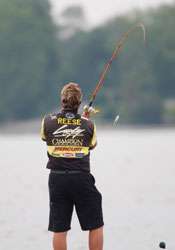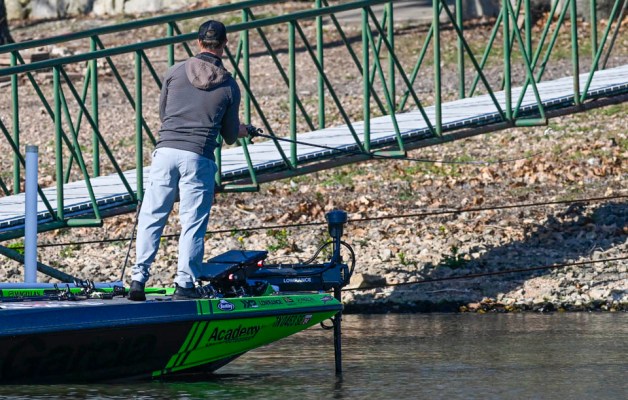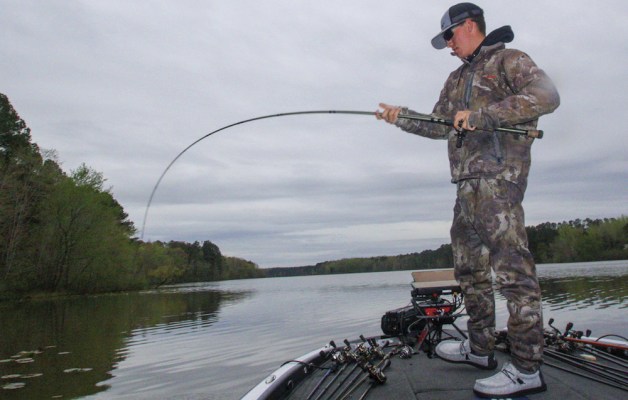
There's a difference between the weekend angler and the top pro. Maybe it's all that extra time on the water or experience under a variety of conditions. Maybe it's an innate sense that helps the cream rise to the top in national competition. Or maybe gear makes the man. Whatever the cause, we polled five of the best anglers in the business to get their opinions on the biggest obstacles between the solid weekend angler and the kind of success we all want in our bass fishing.
If you can follow their advice and learn from your (and others') mistakes, you just might find yourself fishing at a higher level. Here's what the top pros had to say about the biggest mistakes bass anglers make.
1. THEY DON'T PAY ATTENTION TO THE DETAILS
Kevin VanDam has a trophy case that's the envy of anyone who's ever cast a rod and reel. In it you'll find two Bassmaster Classic trophies, three Toyota Tundra Bassmaster Angler of the Year awards and 10 more trophies for winning other BASS events. In 2005 he finished fifth in ESPN's Greatest Angler Debate. If that contest were held today, he'd probably win it.
So what does VanDam think the average fisherman could do better?
"I see a real lack of attention to the details," KVD says. "They don't replace the factory hooks on a crankbait with quality hooks. They don't change their line often they think, 'Well, I should have 14-pound test for that crankbait, but 10 will work.' They'll throw a 1/4-ounce shaky head in shallow water when they know they should switch to a 1/8-ounce. They throw a white spinnerbait in clear water when they know they'll probably get more bites with a translucent shad pattern.
2. THEY DON'T CAST WELL ENOUGH
If you've seen VanDam cast, you have an idea of what's possible with a rod and reel. He's a magician who seemingly can put a lure anywhere and from any angle.
"Most of the bass I catch during the Elite Series season are not feeding," VanDam says. "I catch them because I'm able to make a good, accurate, soft presentation that takes the fish by surprise and creates a reaction bite. You can't do that with a sloppy, inaccurate, splashy cast."
And you can't get better without practice, either, according to VanDam. Even at his level of proficiency, BASS' all-time money winner knows the value of practice. As good as he is, he believes he always can be better, so he practices during the offseason and between tournaments.
"The worst place to practice your casting is probably on the water," VanDam opines. "You'll be too busy worrying about getting bites. The best thing to do is to practice in the backyard or at a swimming pool."
3. THEY FISH HISTORY AND NOT THE CURRENT CONDITIONS
When the smoke cleared on the 2007 Elite Series season, Skeet Reese stood alone at the top, claiming the Angler of the Year title along with winning the Capitol Clash on the Potomac River. It was a solid year all the way around that began with his second-place finish at the Bassmaster Classic.
To perform at such a high level, Reese had to constantly stay on top of the conditions, something that he sees too few weekend anglers do. "Instead, they go back to the place they caught them last week or last month or even last year," he says. "They need to realize that fish change every week, every day or even every hour, depending upon the conditions. If you're not making adjustments as the conditions change — from some clouds moving in to the wind starting to blow from a different direction — you're not going to catch all the bass you should be catching."
4. THEY DON'T USE THE RIGHT LINE
Reese believes that few weekend anglers carry the full assortment of line types and sizes — from 6- to 30-pound test — with them whenever they go fishing. Nor do they make the best use of lines.
He says, "Line diameters and types make a huge difference in lure performance. The difference between 8- and 12-pound line can be enormous. Even on power fishing lakes, like Toho in Florida or Sam Rayburn in Texas, you need lots of lines to choose from so you can make adjustments and catch fish consistently. You need the right lines to get your baits into productive depths or pull fish out of cover or minimize line visibility. It all adds up."
5. THEY DON'T TAKE CARE OF THEIR LINE
Few BASS pros are as consistent as 2005 Angler of the Year and three-time Classic runner-up Aaron Martens. In a world of fishing technicians, Martens puts the rest to shame. He's as painstaking with his gear and his techniques as anyone who has ever held a rod and reel, and, quite naturally, his observations toward the mistakes made by co-anglers and weekend fishermen lean toward the technical.
"I'm amazed at how many fishermen are not taking care of their line," he says. "They don't tie good knots, and way too often I'll see them break off a fish and find that it broke at the knot. I've seen co-anglers lose tournaments because of this, and there's no excuse for it. The knot is one of the few things we really can control in our fishing."
6. THEY DON'T FIGHT FISH PROPERLY
Martens also is a fanatic about fighting fish properly once you have them hooked. "Too many fishermen don't keep good pressure on the fish," he says. "They should be reeling as hard as the line and hooks will allow.
"Keep steady pressure on the bass until you land it. It took me a long time to learn this, but it's something that helps me a lot, and I bet it accounts for half the bass I've seen my co-anglers lose over the years."
7. THEY DON'T GET THE MOST OUT OF THEIR EQUIPMENT
Michael Iaconelli has a reputation for being rough on equipment. He resents when observers tell him that he's "tough on his toys."
"My boat, motors, electronics, rods, reels, lines and lures aren't toys," he says adamantly. "They're the tools of my trade, and I rely on them to perform even under the toughest conditions. If I'm not testing their limits occasionally, I'm probably not getting the most out of them or myself."
For Iaconelli, getting the most out of equipment isn't just about pushing it to the max; it's also about being smart with it and knowing how to make it work best.
"One thing that drives me crazy is watching a fisherman with a spinning rod make a beautiful cast and then engage the reel by cranking the handle rather than flipping the bail manually," he says. "That contributes to line twist and can ruin your day on the water. You have to flip the bail manually and get in the habit of doing it.
Little things like that mean a lot."
8. THEY DON'T FISH THEIR STRENGTHS ON NEW WATER
According to Elite Series angler Greg Hackney, weekend anglers — even the good ones — listen to too much dock talk. The 2004 Toyota Bassmaster Rookie of the Year and five-time Classic qualifier says that just because you're in Rome, you don't have to copy the Romans.
"It's generally a mistake to go to a new body of water and try to fish like the locals," Hackney says. "You need to fish your strengths and find water that suits your style. Listening to a little dock talk is OK if you use it as a guideline or to get an idea of what might be happening on the water, but you can't let it control your fishing."
9. THEY DON'T PUT PATTERNS TOGETHER
Ike has both a Classic championship (2003) and an Angler of the Year award (2006) to his credit. Rising from the ranks of the Federation Nation to the highest level of professional fishing, Ike has shared the boat with lots of good anglers, teaching and learning along the way.
He's noticed that most anglers catch bass without asking some pretty important questions.
"They're so happy just to have caught the fish that they don't ask the right questions," he says. "Did the fish hit on the fall? Was it on the windward side of the dock? Did it come off the point or the pocket of the weed edge?
"If they'd just ask these questions, they would be putting a pattern together that would lead them to lots more bass. The fish are there for a reason, and good anglers figure it out."
10. THEY OVERLOOK THE OBVIOUS
Good bass fishing isn't always about the subtle nuances. Sometimes the best opportunities are staring you right in the face if you'll just open your eyes to look for them. That's what Hackney believes, and he's watched a lot of weekend warriors miss the obvious in search of some hidden mother lode.
"It happens all the time in national tournaments," Hackney says. "We go to a lake and someone wins by fishing an obvious-looking area near the launch ramp. Then the local guys are surprised that he caught them there because it looked so obvious and was so close to the take-off point. Rather than try it themselves, they ignore it because it's a well-known community hole or they think it's been fished so often that it's been picked clean.
They wind up outsmarting themselves."
Correcting even one of these common mistakes won't be easy. You may have to overcome years or decades of bad habits and attitudes. If you can do it, though, you'll be making a real difference in your bass fishing — one that will put more bass on the end of your line, more fish in your livewell and, if you fish competitively, more hardware in your trophy case.




